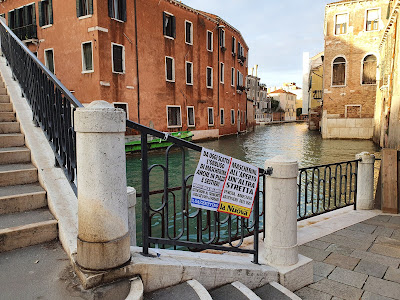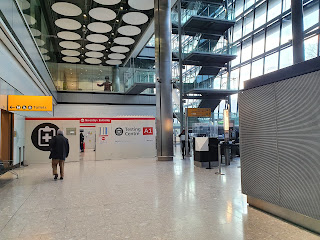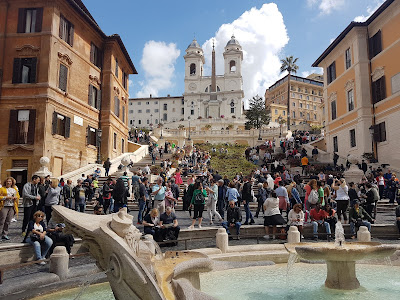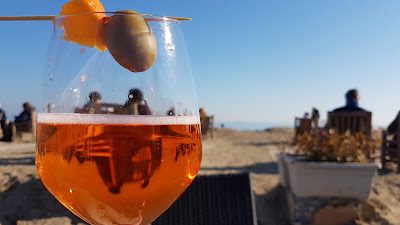As soon as I write this kind of article, it risks being out of date - but here goes. I travelled from the UK to Italy on Sunday 28th November, hours after the red alert was raised over the Omicron variant, with cases freshly found in the UK and Italy. Travel rules were changing by the minute as I packed, not knowing if I'd be allowed to travel. Even at the airport the next morning, waiting for a flight delayed two hours, I was concerned the delay could allow time for required tests to be upgraded, quarantine to be imposed, or UK visitors to be banned.
With these kind of travel stresses blowing up in a matter of days, or hours, it's understandable that many people can't afford the worry or the risks. Those of us with work to do, jobs out of the home, and important appointments will be thinking twice about travelling at any time in the next few months. After all, new variants are by definition likely to be not covered fully by existing vaccines. And as our existing precautions and multiple vaccinations are apparently no longer enough to drop restrictions, the travel industry is experiencing yet another low, after nearly two years of disaster and bankruptcies.
It will clearly take a certain amount of nerve and flexibility to travel over the next few months, or even years. In the meantime, my advice would be to think how much you really want to go (I was pretty desperate to get back to Venice), check all the latest advice and requirements, try to cover yourself for as many eventualities as possible and be prepared for last-minute changes of plan. I was extremely glad I booked my trip and went ahead with it.
 |
| Covid headlines in Venice |
Advice for UK travellers going to Italy
This is for travellers who are fully vaccinated and have proof of their status.
In advance
- Get travel insurance. Travel insurance is critical. Be really careful over what Covid cover is included. I looked at the recommendations of a number of websites, read the small print, and talked to the insurance company over the phone with a list of questions, to be sure I had absolute clarity and a record of what was covered. My needs included cover for costs: if rules changed at either end of my journey to prevent travel; if rule changes (e.g. a potential 5-day quarantine for travellers in Italy) made me choose not to travel; if I had to pay unexpected costs such as hotel quarantine or extending my stay. I found what seemed to be quite comprehensive cover from Churchill, but I won't make a recommendation as I haven't put them to the test yet. Annual cover was surprisingly affordable at £56, though I chose to exclude a specific medical condition, and have a £50 excess.
- Check post-Brexit requirements, if you haven't travelled recently. An EHIC card or latest equivalent, a passport valid for entering the EU, customs rules - don't transport dairy products like cheese sandwiches....
- Check the latest testing and Covid rules for both the UK (departure and arrival) and Italy (arrival and departure)
- Book your pre-travel Covid test. Book a Covid test valid for flying and for entering Italy. Home tests are cheap and easy. When I travelled, and at the time of writing this, a rapid antigen test carried out yourself was sufficient, but must be arranged through an authorised company who'll issue a certificate. This is one of the requirements that could change any time, so check again right before travel that you don't need a more expensive PCR test. Order it a few days before - not too early, in case the requirements change. It will be delivered to your home ready to do the test before flying.
You could also book your return-to-the-UK test in advance too - but I regret booking mine quite so early, as rules changed and I'm left trying to get a refund. Allow enough time to have a home test posted to you for your return, though, or to book a slot at a test centre. More below on return testing.
Useful resources:
https://www.gov.uk/foreign-travel-advice/italy/coronavirus
https://www.britishairways.com/en-gb/information/incident/coronavirus/entry-requirements
https://europa.eu/youreurope/citizens/travel/carry/meat-dairy-animal/index_en.htm
Before travel
1. Do your pre-travel fit-to-fly test
Do your test within the 48 hours before your arrival in Italy - not your departure from the UK. I'd do the test a few hours into this time window, to allow for your flight landing late. I don't know how strict they'd be if your 48 hours had expired due to a flight delay. Also allow time for the testing firm to process your certificate... so the timing took a bit of consideration. I did my test around 6pm on Friday evening, two days before I was due to land in Italy on Sunday at midday.
I used https://www.c19testing.co.uk/ . I paid £22 for the Rapid Antigen Pre-Departure Test, which was quite competitive. The service was very straightforward and efficient, though it rankled that I paid for a test that was the same as free NHS lateral flow tests. This one, though, comes with a code and the ability to validate it for travel.
I did the test, waited 15 minutes for the results, photographed the results alongside my passport, and submitted the photo to the testing company. The firm warns you to allow several hours, but I got my certificate by email only 30 minutes later, and I was declared Fit to Fly. You'll need to download, photograph or scan the certificate. I found the firm extremely efficient and have heard others praise them too.
2. Download your NHS Covid Pass
3. Complete a Passenger Locator Form.
Again this must be done no more than 48 hours before arriving in Italy. I did mine around 39 hours before my scheduled arrival time. I was travelling with British Airways, who provided a step-by-step process for submitting the documentation that will permit you to fly. As part of the process they provided a link to the Passenger Locator Form required for travel to Italy. You can find this yourself here: https://app.euplf.eu/#/. Download your completed form.
4. Submit documentation
Do this after receiving your test certificate. I did this through the British Airways website. The process required me to upload the three documents listed above: my Fit-to-Fly Covid test certificate, my NHS Covid Pass and my Passenger Locator Form. Once this was done, I received a confirmation of submission. Just over an hour later an email onfirmed that my documents had been verified and I was free to check in as soon as check in opened online.
5. Get printing, sort out your Green Pass, and stay organised
I printed off copies of the documentation above as back-up, though the print-outs weren't needed. I also checked my NHS Vaccination Passport and printed out a couple of copies for use in Italy.
In Italy you need a Green Pass to sit indoors at bars and restaurants, visit museums, use public transport and go to theatres. Until recently these have been available by being fully vaccinated or doing a test. But since 6th of December, a Super Green Pass has been needed in most of these situations many things, available only to the fully-vaccinated or recently-recovered. The NHS app works as a Green Pass, and as it shows vaccination status, should work for every environment where either kind of Green Pass is required.
From the NHS website or app, access the 'Travel' pass. To use this as a Green Pass, show the QR code of your second vaccination for scanning. As time moves on, they may accept the QR code of your booster or third jab, but as mine was too recent to count, I haven't tried that. To avoid the hassle of logging into the app each time, and relying on my phone battery, I used a printout in Italy, which I kept folded in my bag along with my passport. You may have to show additional ID along with the Green Pass. At the Palazzo Ducale in Venice the security staff were very thorough - Green Pass check, passport check, temperature taken.
 |
| Venice, seen on arrival from my BA flight |
Travel - Covid and Brexit
Having done all the preparation in advance, my travel itself was relatively smooth. My Covid documents were processed electronically and I never had to see them again, show them to anyone or answer questions about them during the journey to Venice. I checked in online, checked my luggage in at the airport desk, wore a mask, boarded my (very delayed) flight just as usual.
Once onboard, there was another form to fill in for the Italian authorities - one side of A4, basically a health declaration. The crew handed this out and collected it before landing. I'm not sure how the people with cold and cough symptoms on my flight managed to complete this honestly. This was the first point of the journey where any kind of health check or declaration was required; I'd been very surprised by the lack of temperature or visual checks and questions at Heathrow (or is there thermal imaging for passenger temperatures?). One passenger spent his time in the lounge unmasked and coughing and sneezing loudly and continuously. I'd naively thought that any cold-type symptoms would ground passengers.
Once landed at Venice Marco Polo Airport the process was both familiar - I've travelled through here scores of times - and strange. UK passports can be scanned at the non-EU gates. Then you visit an official at a desk to have your passport stamped. There were no Covid-related questions or checks. I'm a champion at getting through the passport controls first (!), so I don't know if there were queues for the people sitting nearer the back of the plane.
I was asked a couple of questions about whether I lived in Italy or the UK, possibly as I spoke Italian. And leaving the baggage reclaim with my luggage I was stopped at the customs check and again asked what country I lived in, where I'd flown from, why I was visiting Italy, along with questions about how much cash I was carrying in euros and sterling. I hadn't even thought to check the rules on currency, though having looked it up, it seems you can actually bring up to €10,000 in without making a declaration. Did I look as though I might be carrying more, or did he just want to make conversation? I looked noticeably more 'foreign' in colouring and dress than the two women who walked through at the same time, also solo and purposeful, so maybe this is a new reality to get used to. In twenty years of travelling between Italy and the UK I've always been free to walk through before now, before Brexit.
My journey wasn't without stress, as in the hours preceding my departure it looked as though rules could change and my trip could fall apart at any time. I was relieved to be in the air and even more relieved once I left the airport in Venice, free from threats of last-minute quarantine or our flight being turned away. Though I also spent the next few days with the shadow of concern of a retrospective recall to quarantine if the UK's Omicron cases scared the Italian authorities.
 |
| Café tables by the Rialto bridge |
In Italy
In Italy you can still have a great time. Venice is as beautiful as ever. I showed my Covid/Green Pass in a restaurant, a bar, two museums and an airport lounge. This was before the pass became compulsory for local public transport. I wore a mask where required and noted that, like last year, 100% of boat passengers were wearing them. No exemptions, no fuss.
Follow the rules and keep your eyes on the news. For example, during my visit a new rule was introduced in which masks were required outdoors in certain areas of some Italian cities, including several of the areas of Venice which are popular with partying youngsters. Wearing masks outdoors is one of the first things that would be likely to be imposed if infection rates rise significantly, and already has been in some areas of the country.
I'll write more later about how I found Venice. It's empty of some of the categories of tourists who'd normally be here - big tour groups, Chinese parties. Some shops have closed and there's a ghostly feel in the places which would have been full of those tourists, such as the big-name designer shopping streets. But there are lots of independent visitors, a few small European tour groups, many local businesses are still doing a good enough trade, or so they say. Some of the changes might not be for the worse, though a big reset is needed for tourism in Venice in particular, and it remains to be seen how the next year will pan out.
 |
| High water in St Mark's Square |
Before returning
UPDATE - As you've probably read, it's currently the case that all travellers to the UK must take a pre-departure test in the 48 hour before their journey. More here: https://www.independent.co.uk/travel/news-and-advice/travel-rules-covid-test-quarantine-b1969929.html. This was introduced the day after my travel, and is in addition to the other requirements listed below.
Before flying back to the UK you'll need to complete another Passenger Locator Form online, and arrange a Covid test to take in the UK by Day 2 after your arrival ('Day 2 PCR test') - you'll need the reference number for your test in order to complete the form and be allowed to travel.
The UK passenger locator form is fairly simple but has some ambiguous questions - I was left puzzling over what might be counted as an island (Venice is an island along with the Lido and other islands of the Venetian lagoon, but presumably these, lake islands and other non-offshore islands aren't the target of the question). Ridiculously, the NHS Covid Pass is not compatible with the UK's Passenger Locator Form. You're required to upload proof of vaccination consisting of a file (image or PDF) containing only one QR code. This may cause a headache, depending on what technology you have with you and your level of expertise, and means it's probably easier for most to complete the whole form on a phone, so you can use the camera.
As with the outward journey, BA provided a link for submission of my downloaded documents, and confirmed they'd been verified about 90 minutes later.
Before the rules changed, I had booked a home Day 2 antigen test for arrival in the UK in advance from https://www.chronomics.com/, which had one of the cheapest prices. Unfortunately this became useless once Day 2 PCR tests were introduced. They do Day 2 PCR tests but I didn't want the delay of having to post a home test. I've requested a refund, which the firm has theoretically offered to customers, but over which they seem to be dragging their feet.
The landscape is changing rapidly. As things stand you can do your arrival PCR test any time up to and including Day 2. You have to self-isolate until you get the result. If you do a self-administered home test, you'll have to wait for it to reach the lab by post, which could obviously give you an extra day or two stuck at home in addition to the lab processing time, so really doesn't seem like a good idea unless you're happy to remain indoors for longer.
The quickest way to get a result seems to be to get a test at an airport testing centre, or one local to you, on arrival. You're allowed out of self-isolation to get a test or post a test.
You'll find more useful information here: https://www.businesstraveller.com/features/how-to-get-a-day-2-pcr-test-at-heathrow-airport/. and here: https://www.moneysavingexpert.com/travel/how-to-find-the-cheapest-private-coronavirus-tests-for-travel/. Airlines frequently offer discounted tests and voucher codes, for example: https://www.britishairways.com/en-it/information/incident/coronavirus/covid19-tests
Note that there is considerable variety in pricing. Some firms have testing centres which are at the periphery of Heathrow and seemingly hard of access. Some have fast drop-off points for home tests that might be convenient for some travellers but not for most. Others have a significant number of bad reviews online. Many don't even offer a turnaround time. Check your arrival airport as a first step.
Day 2 PCR test at Heathrow
Since 3-hour rapid tests were apparently not approved by the government, I booked one of the rapidly-booked-up slots with Expresstest by Cignpost at Heathrow Terminal 5. ExpressTest promise results by 10pm the next day (with a slight get-out clause 'except in some cases'). They also have other test centres. I had to accept the first available slot, which was four hours after my arrival time, but it was suggested by a helpful employee on the phone that as long as you arrive on the correct day, you should be OK if you miss your slot. They're one of the most expensive options at £69 minus a tiny BA discount, but with a test centre in the terminal building, a promised turn-around time and decent reviews, they seem like a good option.
On arrival through a quiet Heathrow I headed straight to the test centre in Terminal 5 - head to the left once you reach the arrivals hall. There were friendly and helpful young staff, and I was given an unofficial nod to enter the queue despite being ahead of time. The wait was a reasonable one, maybe around 15-20 minutes. I showed the QR code they'd emailed me with my booking confirmation, was escorted into the testing area by a friendly staff member who admired my hat, did the test quickly and without discomfort, and was on my way into London on the Piccadilly line around an hour after landing.
I dutifully self-isolated at home that evening and the following morning. I was prepared to spend the day at home until receiving my test result, but I didn't have to wait until the 10pm time they'd given. An email arrived at lunchtime with a link to my test results. I had tested negative and was free to return to normal life less than 24 hours after touching down at Heathrow. I was extremely pleased with the service from ExpressTest and would recommend them based on my experience.
Note: Since I booked my test there was news (via the Business Traveller link above) of a faster saliva test that is permitted, with https://www.haloverify.com/. I haven't looked into this in detail, but Id' recommend checking the latest reports.
The sudden rule changes, vast range of profit-making companies offering tests, and variety of options available, makes things very hard for travellers. Those with money will be able to walk free before those on a budget. You'll be imprisoned at home dependent on the efficiency of your testing company, and only free when they confirm a negative result. There's an obvious need for government regulation and it would be nice to think that soon the system will become more traveller-friendly.
Should I travel to Italy now?
With rates rising, and all the fears over Omicron, right now is an uncertain time for travel, though things may settle quickly. My hope is that this could be the last upheaval for a while, and that it may be the variant which prompts a re-evaluation of responses. I'd booked my travel before this latest scare. However, I was so desperate to get back to Italy after 14 months away, that I'd have taken the chance anyway. If you want to go, don't give up too easily. But get good insurance, only travel if you have some flexibility to cover extra costs, and be prepared for the extra labour and stress involved in monitoring updates, meeting the latest requirements and dealing with paperwork.
My own trip was manageable. My outbound test cost £22, plus time for the paperwork. I had no issues with my Green Pass/NHS Covid Pass. I spent £17 on a return test, which was rendered useless by the rule change, and am hoping for a refund. I spent £67 on a Day 2 PCR test, an additional cost that I wasn't expecting. I had to spend a short time self-isolating at home, with the concern this could have increased if the rules changed or the testing firm was slow. My travel insurance would cover the cost (they assured me) of additional expenses such as hotel quarantine, and they may cover the money I've spent on the Day 2 PCR test, as an unexpected extra cost, minus the £50 excess.
Italy is still beautiful, peaceful with fewer tour groups, and local businesses are very glad to welcome Italy-loving visitors. After the last couple of years, it can be amazingly refreshing, reinvigorating and life-affirming to travel and explore, or to return to much-loved places. In my case, the benefits of travel hugely outweighed the extra hassle of Covid restrictions.
If you decide to book travel, please consider using the booking links on my website https://www.italyheaven.co.uk/ or the link below. That way you won't pay more, but I will earn a small commission which might help to keep the website online and update it after a couple of years of running it out of my own pocket with no furlough, salary or government support. Thank you!
> Hotels, B&Bs and apartments in Italy from Booking.com (affiliate link)
Follow me on Twitter or Instagram for my photos from Venice.
 |
| Christmas tree in the Piazzetta |














